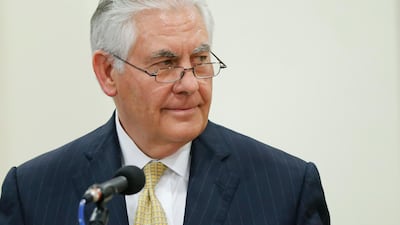In parallel with a visit this week by US national security officials to Israel to discuss Tel Aviv’s concerns over the US-Russia de-escalation deal and Iran’s presence in South Syria, a bipartisan group of 43 congress members sent a letter to US secretary of state Rex Tillerson echoing the same demands and calling for a change of strategy in Syria.
The letter, dated November 14 and signed by members of both main parties after their trip to Israel, called for “a strategy for Syria that includes how the United States plans to prevent Iran from gaining a permanent foothold on Israel and Jordan’s doorstep and to block Iranian arms exports to Hizbollah”.
The letter opened with an expression of “concerns regarding Iranian presence in Syria. We recently returned from the region where we heard concerns from our close ally, Israel, about Iranian operations in Syria, particularly since the signing of a ceasefire last July, which set up de-escalation zones on Israel and Jordan’s border.”
It added: “Iran is providing substantial amounts of support to the Syrian regime, including funds, weapons and personnel from IRGC-Quds force. Iran is estimated to have deployed about 1,300-1,800 IRGC soldiers and even some regular army special forces personnel to Syria.”
The 43 congress members warned that "should Iran be allowed to maintain a permanent military presence in Syria, it would pose a significant threat to Israel, Jordan, and United States interests.”
They mentioned the risk of an Iranian corridor from Tehran through Iraq to Syria and into Lebanon if the strategy is not changed. "A permanent Iranian presence in Syria would connect Lebanon-based Hizbollah to Iran via Iraq and Syria. This would give Iran the ability to project power from the Persian Gulf to the Mediterranean Sea."
_______________
Read more:
US delegation in Israel to soothe concerns over Syria ceasefire deal
American policy in Middle East 'ambiguous and chaotic', experts say
Trump and Putin endorse political solution to Syria conflict
_______________
They cautioned one week after the US agreed with Russia on a de-escalation deal in southern Syria, that “any agreement or policy that allows Iran to station forces on or near Israel and Jordan's border does not serve US interests”.
"We urge you to come to congress with a strategy for Syria that includes how the United States plans to prevent Iran from gaining a permanent foothold on Israel and Jordan’s doorstep and to block Iranian arms exports to Hizbollah.”
"Hizbollah’s 150,000 rockets and missiles [are] larger than that of most states and could pose a grave military threat to Israel,” they wrote.
The letter came as a White House delegation continued its visit to Israel to soothe Israeli concerns over the Syrian deal. A US spokeswoman at the national security council said: "We have an important, strategic, strong, collaborative relationship with Israel, and US government delegations routinely visit Israel to coordinate on a wide range of issues.".
Tobias Schneider, an international security analyst based in London, said that "while the US [with Russia] has made the south-west de-escalation zone a priority in its Syria policy, it has no realistic means of actually rolling back Iranian influence across the border."
He added: “Iran not only runs networks of tens of thousands of militiamen, but also [has] increased its reach in economics and politics.”


